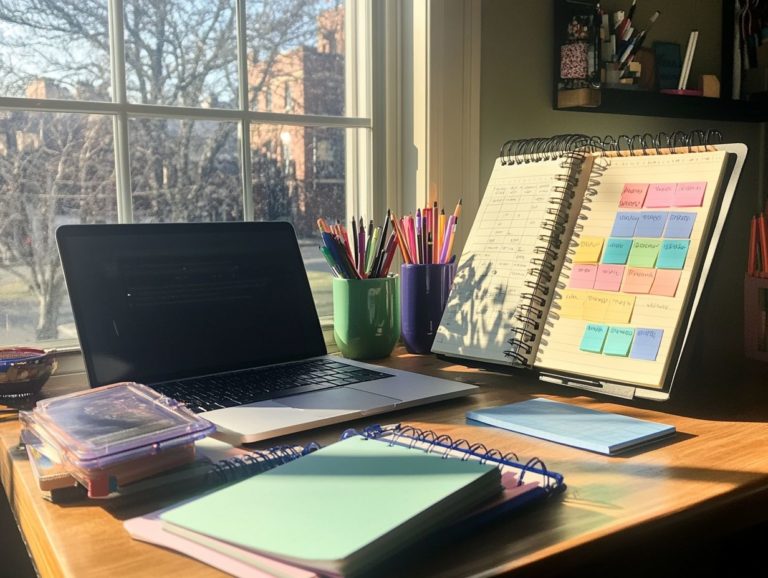the importance of breaks during study sessions
Studying can often resemble a marathon, yet incorporating regular breaks is essential for sustaining focus and enhancing retention.
This article delves into the substantial impact of study breaks. It emphasizes their advantages in alleviating stress and fatigue while simultaneously boosting productivity.
Additionally, it presents effective strategies for seamlessly integrating breaks into your study routine, addresses typical pitfalls to avoid, and offers guidance on crafting a balanced study schedule.
Uncover how to optimize your study sessions for superior results and cultivate a healthier mindset.
Contents
- Key Takeaways:
- The Impact of Study Breaks
- Benefits of Taking Breaks
- Incorporate Breaks Effectively
- Common Mistakes to Avoid
- Creating a Balanced Study Schedule
- Frequently Asked Questions
- What is the importance of taking breaks during study sessions?
- How often should I take breaks during a study session?
- What are some activities I can do during breaks?
- What are the benefits of taking breaks during study sessions?
- How long should breaks be during study sessions?
- Why should I take breaks? What happens if I don t?
Key Takeaways:

Regular breaks during study sessions improve focus and retention, leading to better academic performance.
Taking breaks reduces stress and fatigue, allowing for more efficient and effective learning.
Incorporating effective break strategies and creating a balanced study schedule can prevent overworking and burnout.
The Impact of Study Breaks
The impact of study breaks on cognitive performance and overall academic success is significant. Research highlights that effective breaks are essential for recharging your brain and maintaining mental well-being, especially when navigating the demands of academic life.
By incorporating regular study breaks, you can recharge and come back stronger, leading to productivity boosts and the adoption of effective relaxation techniques. This, in turn, enhances learning outcomes and paves the way for greater academic achievement.
Understanding the Importance of Breaks
Students must understand why breaks are important to boost productivity and alleviate stress during intense study sessions. Breaks can significantly enhance focus and promote better learning outcomes.
Allowing your brain some much-needed downtime provides a welcome escape from information overload. These intervals also play a vital role in cognitive functions like memory retention. Engaging in brief distractions can help reduce anxiety, creating a more supportive learning environment.
Effective break strategies, like the Pomodoro Technique a time management method that uses short work intervals followed by breaks and mindfulness exercises can boost your time management, making study sessions more productive.
Ultimately, these pauses empower you to return to your tasks with renewed energy and clarity, unlocking your full potential.
Benefits of Taking Breaks
The advantages of incorporating breaks into your routine go far beyond simple relaxation. Research from esteemed institutions such as Harvard University and the NIH reveals that effective breaks can significantly enhance cognitive performance and improve memory consolidation.
By prioritizing these moments of pause, you unlock a pathway to deeper engagement and greater success in your endeavors.
Improved Focus and Retention

Incorporating effective breaks during study sessions significantly enhances your focus and retention. It allows your brain to engage in the importance of self-care in study techniques, helping you revisit information and assimilate it more effectively.
For instance, employing techniques like the Pomodoro method not only structures your study time efficiently but also integrates short breaks that rejuvenate your cognitive faculties. During these intervals, your mind has the opportunity to reflect on the concepts you’ve learned, which ultimately improves memory retention and deepens understanding.
Strategies such as active recall and spaced repetition become even more powerful when interspersed with breaks, establishing a rhythm that helps consolidate knowledge effectively.
Don t wait! Make taking breaks a priority now to see immediate benefits in your studies.
Summary: Study breaks are crucial for improving focus, retention, and overall academic performance. By integrating effective strategies, you can boost your productivity and reduce stress, setting the stage for success.
Reduced Stress and Fatigue
Taking regular breaks is essential for reducing stress and combating brain fatigue, especially during lengthy study sessions. These moments of pause serve as vital relaxation techniques that help alleviate anxiety.
These intervals provide a perfect opportunity for your mind and body to reset. This ultimately leads to improved thinking ability and heightened productivity. Research shows that even short breaks can significantly lower cortisol levels, the stress hormone, helping to release built-up tension.
Incorporating practices like deep breathing, mindfulness meditation, or quick physical activity can help you feel calm and refreshed. Such methods enhance focus and clarity, enabling you to tackle challenging tasks more effectively and with a clearer sense of purpose.
Incorporate Breaks Effectively
Incorporating breaks into your study sessions can be easily achieved through various effective strategies.
One standout method is the Pomodoro technique. This approach optimizes time management and encourages self-monitoring for enhanced productivity.
Effective Break Strategies
Implementing effective break strategies, such as movement breaks and creative activities, elevates your motivation and enhances your study techniques.
These approaches urge you to step away from your tasks, giving your mind a chance to recharge.
Movement breaks whether stretching, practicing yoga, or dancing stimulate blood flow and invigorate your thinking ability, making it easier to focus when you return.
Engaging in creative activities like drawing, crafting, or playing an instrument nurtures a sense of accomplishment and exploration.
Together, these strategies foster a balanced environment that promotes mental engagement, boosts productivity, and enhances information retention, ultimately giving you the power to master your subjects more effectively.
Common Mistakes to Avoid

Recognizing common pitfalls like overexerting yourself and succumbing to digital distractions is crucial for maintaining effective study habits.
This helps prevent burnout during tough study times.
Overworking and Burnout
Overworking without adequate breaks can lead to burnout, impacting your mental health and academic performance. This often results in heightened anxiety and decreased productivity.
This relentless cycle drains your physical energy and saps your emotional resilience, creating a vicious loop of stress and fatigue.
You may struggle to concentrate, experience a drop in motivation, and even feel irritable all of which hinder your ability to excel.
Take charge now! Use time management, incorporate regular relaxation techniques like mindfulness, and maintain a balanced lifestyle with physical exercise and social connections.
By prioritizing your well-being, you can reclaim your focus and passion for learning, paving the way for personal growth and academic success.
Creating a Balanced Study Schedule
A balanced study schedule boosts your chances of academic success. It helps you manage your time effectively, integrating both study techniques and rejuvenating break activities.
This thoughtful approach enhances your learning while ensuring you remain refreshed and focused throughout your study sessions.
Ready to take your study sessions to the next level? Apply these tips immediately!
Tips for Balancing Study and Breaks
Balancing your study sessions with effective relaxation techniques is essential for maintaining productivity and enhancing creativity in your learning tasks.
To achieve this balance, it is important to embrace organized study plans that include intentional breaks. The Pomodoro method involves studying for a set time, typically 25 minutes, followed by a short break. This framework helps you maintain focus and productivity.
During breaks, indulge in relaxing activities such as deep breathing exercises, mindfulness meditation, or light stretching. These can significantly elevate your mental clarity. Allowing your mind to wander creatively during these intermissions often sparks innovative ideas. Don’t underestimate the power of a short break it’s your secret weapon for better study sessions!
Frequently Asked Questions

What is the importance of taking breaks during study sessions?
Taking breaks during study sessions is important because our brains need time to rest and recharge. Understanding the importance of breaks during study can prevent fatigue, which decreases our ability to focus and retain information.
How often should I take breaks during a study session?
It is recommended to take a 5-10 minute break every 45-60 minutes of studying. This allows enough time to recharge without losing too much momentum.
What are some activities I can do during breaks?
You can take a short walk, stretch, listen to music, or simply close your eyes and relax. The key is to give your brain a break from studying and engage in a different activity.
What are the benefits of taking breaks during study sessions?
Taking breaks can improve productivity, memory retention, and overall well-being. It allows for better focus and concentration during study sessions and can prevent burnout.
How long should breaks be during study sessions?
Breaks should be long enough to give your brain a rest but not so long that they disrupt your studying. Aim for a 5-10 minute break every 45-60 minutes.
Why should I take breaks? What happens if I don t?
If you don’t take breaks, you may experience mental fatigue and struggle to retain information. You might also become unmotivated and lose productivity. Prioritizing breaks is vital to maximize your studying efforts.
Implement these tips to enhance your study sessions and achieve your learning goals!





